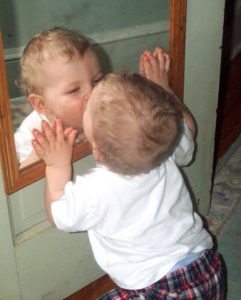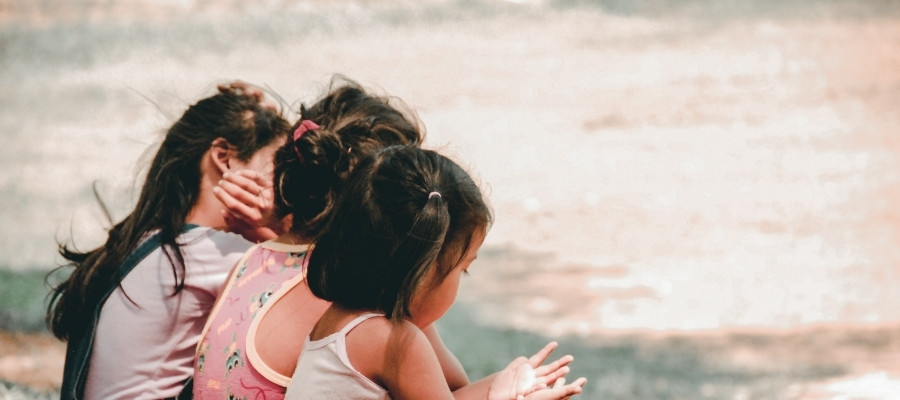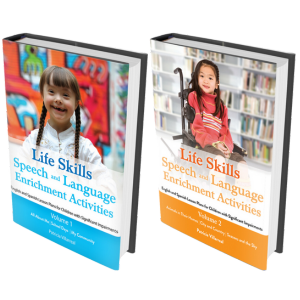The topic of “Social Skills” has grown to encompass all aspects of a student’s day. Students with these difficulties have benefited tremendously from all the attention to detail. However, when we receive a student who has social skills goals, what do we focus on specifically? We have identified some major areas that you can focus on to improve social skills.
You can drill down and spend some time in each of the following areas or augment goals at the next IEP meeting to include these as objectives.
 Ability to self-monitor
Ability to self-monitor
Have you ever worked with a student who performs well each session but comes back having forgotten everything? Or who can interact perfectly in a social situation but if the situation changes slightly it is like starting from scratch? Consider using memory skills in your teaching so that they have a way to self-monitor. A mnemonic, song, rap, or a numbered sequence can help a child remember what to say or do and what comes next.
There is an additional benefit to relying on memory skills. When a child or teacher reports a botched social interaction, we can use the memory scheme to trouble shoot where the breakdown occurred and make a repair.
Participating in new activities
Being out in the big ol’ scary world means we can never anticipate what we will encounter and what we will do. Conversely, our students and clients depend heavily on routine. We should develop a method to add something novel to their routine and then practice the event in a safe environment.
Example: a teacher of a student with Autism battled every time the schedule changed. Her student broke down on picture day, author visits to the library, and things like the hearing screening. We added a purple question mark to the schedule and practiced with tiny changes. This student asked a million times each of those mornings about what was going to happen. But, eventually he was okay and welcomed the change when it was something good, like a pizza party.
Interests and hobbies

We learn best when motivated and interested. Many of our students have really specific interests. Rather than avoiding the topic a child perseverates on, we can use the topic to teach proper conversational sharing and then transfer the abilities over to academic concepts.
Example: a student I had was nuts about Clifford. Luckily there are A LOT of Clifford books and we were able to develop a story-telling structure which we mapped on to many Clifford books, moved over to Froggy books, and then on to regular life.
Interactions with someone their own age
We are adults and demand a lot from our children. We also know what to expect and can fill in the gaps when we are practicing communication. However, we cannot assume social interactions have developed appropriately until a child has attempted to communicate with someone his or her own age. Practice each new ability and then borrow a kind student from the classroom to see if there are any breakdowns in communication that haven’t been noted previously.
Non-verbal cues

So much happens non-verbally among children that to miss the visual cues can mean missing half of the conversation. Improving social skills is heavily dependent on a child’s ability to monitor the part of communication that does not happen with words. If you have a student or child that “gets in trouble” frequently then this area of focus is for you.
Fights, arguments, and perceived hurtful behavior can often be linked back to missing the non-verbal cues. Turn your student into a Social Detective so that they can be on the lookout for social cues that they wouldn’t innately perceive.
Example: When the 1st grade class at my school went out to recess, the Line Leader held the door and each student would attempt to tickle him or her as they passed. The students carefully watched the teacher at the front to see if they would get away with it each day. My student saw what everyone was doing and wanted to join in just like everyone else. When he passed the Line Leader he socked him in the stomach sending him backwards into the grass. Of course the teacher had just turned around and it looked unprovoked and malicious. We used ideas from You are a Social Detective to study the school transitions and to take cues from the teacher and other students.
How to Improve Social Skills in Real Life

To see some real-life applications of ways to improve social skills check out these Social Stories at Kidmunicate. They have done a great job sharing how their families have taken their abilities out into the world. Namely, our main end goal: to be social.
The focus of this article is not to identify therapy techniques that focus on each area, but there are a ton of area-specific resources that are one Google search away. Have something you love though? Mention it below!



